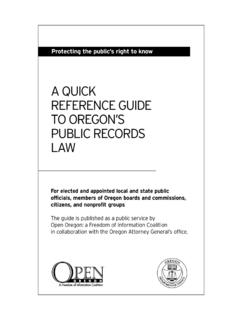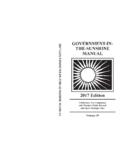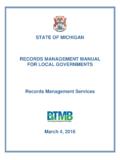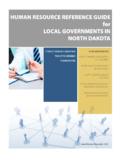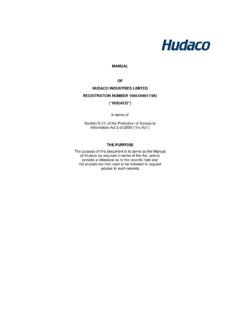Transcription of A QUICK REFERENCE GUIDE TO OREGON’S PUBLIC …
1 A QUICK REFERENCE GUIDETO OREGON S PUBLIC MEETINGS LAWFor local and state officials, members of Oregon boards and commissions, citizens,and non-profit groupsThis GUIDE is published as a PUBLIC service by Open Oregon: a Freedom of information Coalitionand the Oregon Attorney General s the PUBLIC s right to know2A Time Saving ReferenceThis GUIDE is brought to you free of charge as a joint projectbetween Open Oregon: A Freedom of Information Coalition andOregon Attorney General Hardy Myers. Funding for this bookletcame from the National Freedom of Information Coalitionthrough a grant from the John S. and James L. to Use This GuideThis summary is intended as a QUICK REFERENCE to the OregonPublic Meetings Law. The entire law may be found in OregonRevised Statutes to Additional information maybe obtained by sending an e-mail request to or visiting For a comprehensive analysis of the law, refer to the latestedition of the Attorney General s PUBLIC Records and MeetingsManual, available for a nominal fee by calling (503) 378-2992 orwriting to Department of Justice, Administrative Services, 1162 Court Street NE, Salem, Oregon is Open Oregon?
2 Open Oregon: A Freedom of Information Coalition is a non-profiteducational and charitable organization with a single purpose: toassist and educate the general PUBLIC , students, educators, publicofficials, media and legal professional to understand andexercise: Their rights to open government. Their rights and responsibilities under the Oregon PUBLIC meetings and records laws. Their rights under the federal Freedom of Information Oregonis a 501(c)(3) non-profit Spirit of Oregon s PUBLIC Meetings LawUnderstanding the letter of the PUBLIC Meetings Law is critical. Equally important isunderstanding and committing to the spirit of that law. PUBLIC bodies should approach the law with openness in mind. Open meetingshelp citizens understand decisions and buildtrust in government. It is better to comply with the spirit of the law and keep deliberations Value of Openness4 Government accountability dependson an open and accessible process.
3 Hardy MyersOregon Attorney General PUBLIC bodies must conduct businessin PUBLIC - it s really that simple. Bill BradburyOregon Secretary of StateHonorary Co-Chair, Open Oregon Oregon needs to protect its traditionof openness. Dave FrohnmayerPresident, University of OregonHonorary Co-Chair, Open OregonOregon s PUBLIC Meetings Law Open government or sunshine laws originally were enactednationwide in the early 1970s because of growing publicunhappiness with government secrecy. As a result, every stateand the District of Columbia enacted laws requiring governmentto conduct its business openly, rather than behind closed government laws benefit both government and the gain by having access to the process of deliberation enabling them to view their government at work and toinfluence its deliberations.
4 Government officials gain credibilityby permitting citizens to observe their information-gatheringand decision-making processes. Such understanding leads togreater trust in government by its citizens. Conversely, officialswho attempt to keep their deliberations hidden from publicscrutiny create cynicism, erode PUBLIC trust and s PUBLIC Meetings Law was enacted in 1973 to make surethat all meetings of governing bodies covered by the law areopen to the PUBLIC . This includes meetings called just to gatherinformation for subsequent decisions or law also requires that the PUBLIC be given notice of the timeand place of meetings and that meetings be accessible toeveryone, including persons with PUBLIC Meetings Law guarantees the PUBLIC the right to viewgovernment meetings, but not necessarily to speak at bodies set their own rules for citizen participation andpublic is covered?
5 Because questions often arise about what groups must complywith the PUBLIC -meetings law, it is useful to look at the definitionsin the law. The law says that any governing body of a publicbody is required to comply. It offers these definitions: A ppuubblliicc bbooddyy is any state, regional, or local governmentalboard, department, commission, council, bureau, committee,subcommittee, or advisory group created by the state constitution,statute, administrative rule, order, intergovernmental agreement,bylaw or other official act. A ggoovveerrnniinngg bbooddyy is two or more members of a PUBLIC bodywho have the authority to make decisions for or recommendationsto a PUBLIC body on policy or administration. A group withoutpower of decision is a governing body when authorized to makerecommendations to a PUBLIC body, but not when therecommendations go to individual PUBLIC officials.
6 A school board must meet in PUBLIC . So must most advisory committees that the school board creates, such as a budget committee. But if the school board chair asks several business leaders to meet with him to discuss future building needs, that meeting may be held in bodies, such as non-profit corporations, do not have to comply with the PUBLIC -meetings law, even if they receive publicfunds, contract with governmental bodies or perform PUBLIC services. A school district contracts with Regence BlueCross BlueShield of Oregon to provide health insurance for districtemployees. The BlueCross BlueShield board of directors is not required to meet in agencies contracting with private bodies may require a privatebody to comply with the law for pertinent meetings. Federal agenciesare not subject to Oregon s PUBLIC Meetings is a PUBLIC meeting ?
7 A PUBLIC meeting is the convening of any governing body forwhich a quorum is required to make or deliberate toward adecision on any matter, or to gather information. Decisions mustbe made in PUBLIC , and secret ballots are prohibited. Quorumrequirements may vary among governing bodies. A county commission s goal-setting retreat is a PUBLIC meeting if a quorum is present and they discuss officialbusiness. A training session for the commissioners is not a publicmeeting, unless a quorum is present and the commissionersdiscuss official business. A staff meeting absent a quorum of commissioners, whether called by a single commissioner or a non-electedofficial, is not a PUBLIC accomplished by telephone conference calls or otherelectronic means are PUBLIC meetings. The governing body mustprovide PUBLIC notice, as well as a location where the PUBLIC may listento or observe the bodies must hold their meetings within the geographicboundaries of their jurisdiction.
8 However, a governing body may meetelsewhere if there is an actual emergency requiring immediate action orto hold a training session, when no deliberation toward a decision isinvolved. A library board is free to rotate meetings at different libraries in its district, but it may not meet outside its and state law requires that meetings be held in placesaccessible to individuals with mobility and other is Exempt from the Law?On-site inspections, staff meetings and gatherings ofassociations to which a PUBLIC body or its members belong arenot considered PUBLIC meetings. Chance social gatherings arenot considered meetings as long as no official business isdiscussed. Three out of five city councilors inspect a new landfill inspection does not constitute a PUBLIC meeting , unlessthey deliberate toward a decision on a city matter.
9 Later, the three city councilors attend a League of OregonCities conference. Again, this is not a PUBLIC meeting , unlessthe councilors discuss official city business. That evening, the three councilors chat during a concertintermission. As long as they talk about the music, this is not a PUBLIC meeting . But it they stray into discussion of official city business, then it exempt from the PUBLIC Meetings Law are: Meetings of state or local lawyers assistance committees. Meetings of medical peer review committees. Meetings of multidisciplinary teams reviewing child abuse and neglect fatalities. Judicial proceedings. However, see Oregon Constitution, Section 10. Review by the Workers Compensation Board and the Employment Appeals Board of hearings on contested cases. Meetings of the Energy Facility Siting Council when it reviews and approves security programs.
10 The Oregon Health and Science University regarding presidential selection process, sensitive business matters, or meetings of faculty or staff committees. Mediation by the agricultural mediation service some entities, the deliberation process alone is exempt, althoughinformation-gathering and decision-making must be PUBLIC . This appliesto the State Board of Parole, the Psychiatric Security Review Board, andstate agencies conducting hearings on contested cases under theAdministrative Procedures of MeetingsGoverning bodies must give notice of the time, place and agendafor any regular, special or emergency notice must be reasonably calculated to give actual noticeto interested persons and media who have asked in writing to benotified of meetings and general notice to the PUBLIC at bodies wishing to provide adequate notice shouldstrive to provide as much notice as possible to ensure that thosewishing to attend have ample opportunity a week to 10 daysfor least 24-hour notice to members of the governing body, thepublic and media is required for any special meeting .
